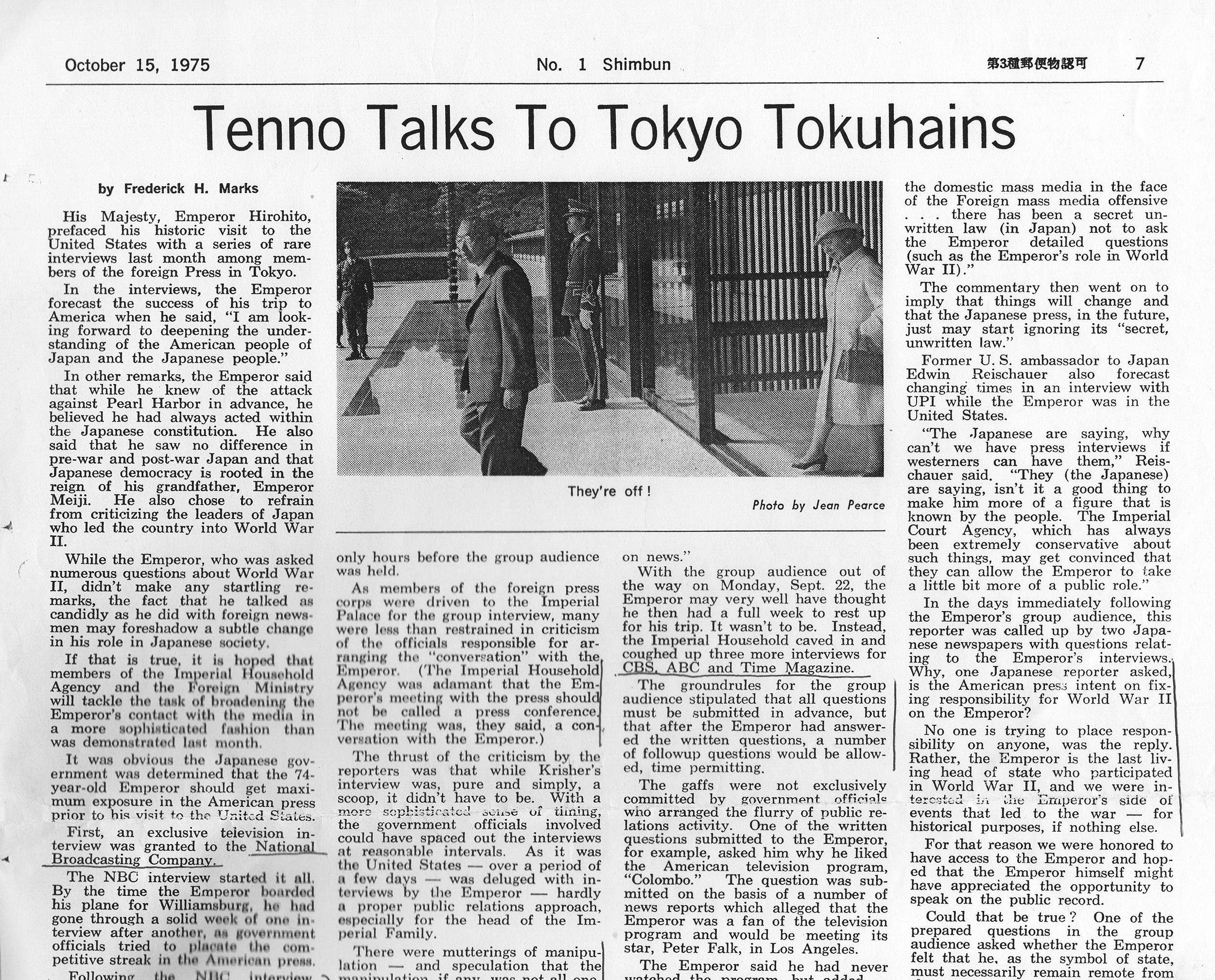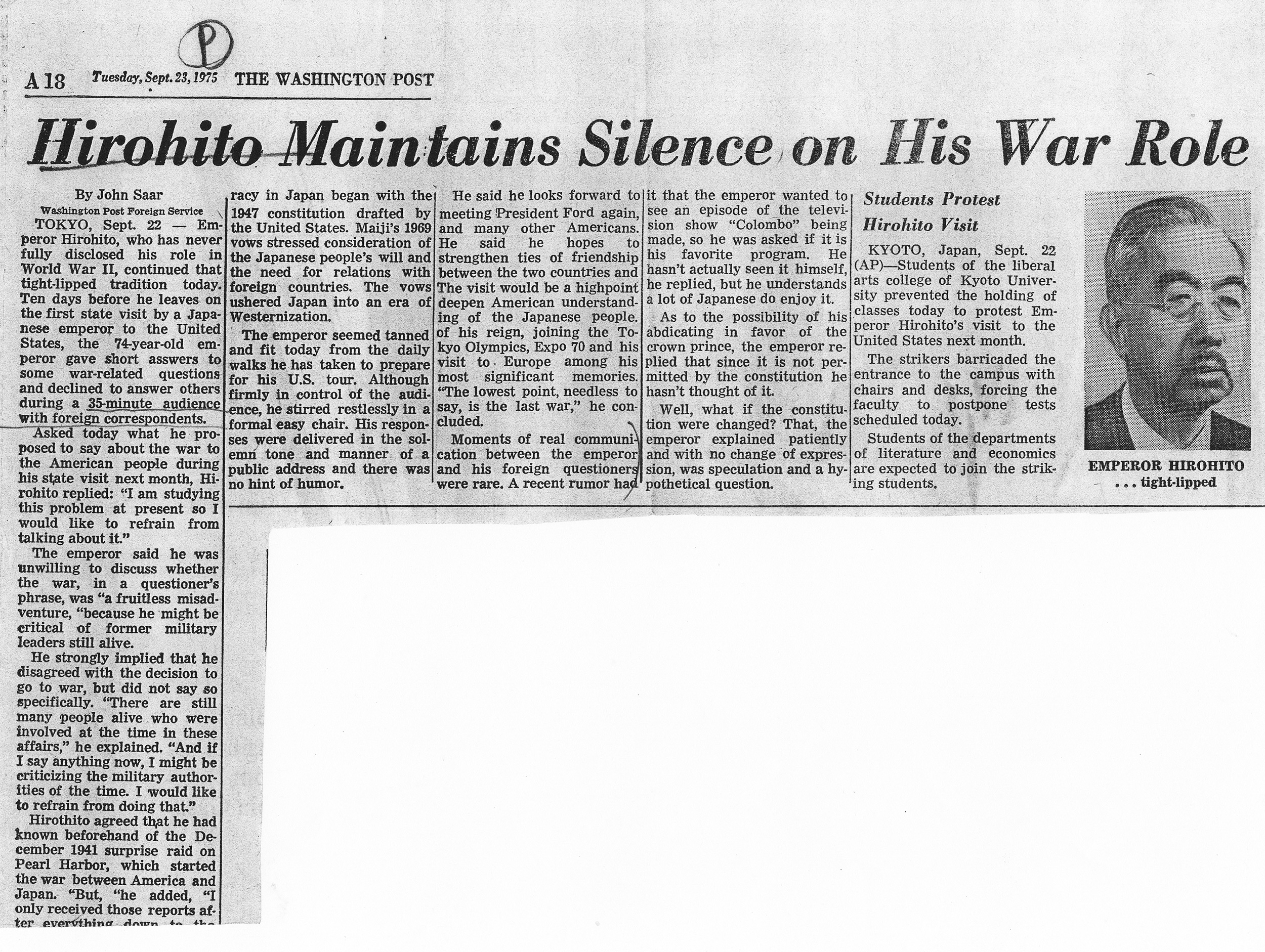Issue:
October 2025
The emperor's 1975 press conference with the foreign press helped shape the imperial family’s relationship with the Japanese public

The Foreign Correspondents' Club of Japan observes its 80th anniversary this year. Founded at the end of World War II, the club has been witness to Japan's postwar history, from the chaos of the immediate postwar period to reconstruction, high economic growth, and the birth and collapse of the bubble economy.
During this time, Japan's era names changed from Showa to Heisei to the present Reiwa. Over these years, many guest speakers, from prime ministers to prominent business and cultural figures, have visited the club, which is known as "the place where news is made".
One of the most newsworthy and controversial events to date was Emperor Hirohito's press conference half a century ago.
On the afternoon of September 22, 1975, FCCJ reporters were invited to the Shakkyo-no-Ma (drawing room) of the Imperial Palace. Eight days later, the emperor and empress were scheduled to make their first official visit to the United States. At the invitation of U.S. President Gerald Ford, the couple's visit would last about two weeks, taking in such cities as Washington, D.C., New York, Chicago, and others. Coming as it did 30 years following the end of the war, the visit was viewed a landmark event in the history of Japan-U.S. diplomacy.
The FCCJ's archives retain the list of participants for this press conference, as well as a record of the questions and answers. Typed on five sheets of paper bearing the club's letterhead, the document shows that nearly 30 people attended, including correspondents from AP, UPI, the Washington Post and the New York Times.

Interestingly, the document's title uses the term "audience" as opposed to "press conference." Also, while it was typical for a guest speaker to come to the club, in this case the procedure was reversed. The press conference took on a special character. And the question-and-answer session was also out of the ordinary, with the reporters repeatedly questioning the emperor directly about his war responsibility. Below are some excerpts.
Q: How long before the attack on Pearl Harbor were you aware of the plan to attack and did you approve of the plans?
A: It is a fact that I received reports on military operations beforehand. But I only received those reports after everything, down to the most minute detail, had been decided upon by the staff of the high command of the fighting services. Concerning affairs of a political nature or those relating to the high command of the fighting services, I believe I acted according to the provision of the Constitution.
Q: Many Americans you may meet have read a book published recently which asserts that you were the leader in the militarist movement in the 1920s, 1930s and early 1940s. Are you aware of the charges and what is your response?
A: I have heard of this book but I do not know the contents so I would like to avoid making any comments about the book. As I have said, I have always acted according to the provisions of the Constitution.
Q: Your Majesty, in regard to your earlier answer about there being no change in Japan – do you feel then that the Japanese people are still capable of being easily led into a militaristic path again?
A: No, I do not have any worries about that possibility because that is prohibited by the Constitution.
Q: In recalling your role in the late 1930s and1941, you said you acted in accordance with Constitutional practices. This suggests you were not in a position to contradict the military authorities. Could you recall whether you had any personal feeling that they were leading your country into a fruitless misadventure?
A: There may have been such facts as you have mentioned but there are still many people alive who were involved at the time in these affairs. And if I said anything now, I might be criticizing the military authorities of the time. I would like to refrain from doing that.
Other questions addressed the emperor's status as a symbol of the nation under the post-war constitution and the possibility that he might have abdicated. These were politically sensitive subjects that were likely to provoke controversy.
Immediately after the war, the International Military Tribunal for the Far East was held in Ichigaya, Tokyo. As a result, seven Class A war criminals, including former Prime Minister Hideki Tojo, received death sentences and were executed by hanging. At the time, the Japanese government's greatest fear was that Hirohito would be prosecuted as a war criminal or ordered to appear in court as a witness. Fortunately, both scenarios were avoided, but if they had occurred, similar exchanges would have been likely.
In one sense, the FCCJ played the role of prosecutors at the Tokyo Trial.
The press conference was widely reported not only overseas but also in Japan. Shortly afterwards, a Japanese reporter asked a club member: Why does the American press intend to fix responsibility for World War II on the emperor?
According to the Number 1 Shimbun at the time, the member replied: “No one is trying to place responsibility on anyone. Rather, the Emperor is the last living head of state who participated in World War II, and we were interested in the Emperor’s side of events that led to the war – for historical purposes, if nothing else.”
In fact, this was the first time the emperor had spoken about his war responsibility in his own words. The interview also drew criticism from some Japanese. The emperor said he wanted to refrain from commenting because many military personnel involved in the war were still alive, and he didn't want to appear to criticize them. Social psychologist Hiroyoshi Ishikawa commented in Shukan Asahi magazine: "That's unpleasant. If it's causing trouble to the living, what about those who died in the war?"
At the time, only 30 years had passed since the end of the war. Many former soldiers had endured hellish experiences on the battlefield, and many civilians had lost family members in air raids. It was to these people that the emperor's real voice regarding the war was delivered. It was easy to imagine strong repercussions from both the right and left, conservative and liberal. So why did he hold the press conference?
In fact, behind this was the hidden machinations of Japan's Ministry of Foreign Affairs. They didn't want the emperor's responsibility for the war brought up again. However, if he proceeded to visit the United States, it would raise a chorus of criticism in the U.S. As a result, they tried to seize the initiative by using the foreign press corps in Tokyo.
The Emperor's planned visit to the United States was officially announced in February 1975. The following month, the ministry established a preparation committee to lay the groundwork. The committee was chaired by the vice minister, and included the deputy minister and chief of protocol as members. Records of this committee are kept at the Diplomatic Archives in Azabudai in Minato-ku, Tokyo.
According to declassified files, a document was prepared on April 21 outlining the main problems of the emperor's visit to the U.S., with an emphasis on the issue of his role in the war.
"In the United States, His Majesty is most closely associated with memories of World War II. The American intelligentsia's perception of Japan has been improving significantly in recent years. However, the public's indifference and ignorance toward Japan clearly differs from the Japanese people's perception of the United States. We must be prepared to some extent for articles full of distortions and errors, such as describing His Majesty as the ‘Emperor in the Orient,’ in countless local newspapers in the U.S."
The files added: "Americans have not forgotten Pearl Harbor. This will undoubtedly spark various discussions about His Majesty's war responsibility."
A week later, Japan’s ambassador to the U.S., Takeshi Yasukawa, sent Foreign Minister Kiichi Miyazawa a diplomatic cable marked "Top Secret" and "Urgent," listing anticipated questions that would be asked if the emperor were to be held accountable for the war. Among these questions were:
- Was Japan's entry into World War II the emperor's will?
- Why didn't the emperor prevent the attack on Pearl Harbor?
- Is the emperor responsible for the Japanese military's actions, such as the Bataan Death March?
- Shouldn't the emperor have at least abdicated and taken responsibility for the war?
If things had continue in that vein, the local media would have repeatedly raise these questions during the emperor's visit to the United States. If that had happened, the visit may have been seen as a failure. Senior government officials, including Miyazawa, must have been alarmed by the possibility. In late May, the Ministry of Foreign Affairs compiled a strategy for overseas public relations for the emperor's visit. The document contained the phrase "PR for Tokyo-based American correspondents."
Looking at it this way, we can see the background to the FCCJ press conference with the emperor. The government wanted to avoid any grilling of the emperor in the United States. To achieve this, they simply had to have reporters who knew Japan well and had a certain sense of affinity with it to write the articles in advance. This would help to discourage vicious reporting about Hirohito.
It was a preventive and pre-emptive attack, so to speak, with FCCJ reporters weaponized for the occasion. It was expected that questions about the emperor's war responsibility would arise at the press conference, which could potentially provoke criticism of him at home. But the Japanese government probably saw it as a risk it had to take.
On the morning of September 30, 1975, rain that had been falling the day before had stopped and Tokyo's Haneda Airport was bathed in sunshine as the emperor and empress departed for the United States on a specially chartered Japan Airlines plane. Two months later, the Ministry of Foreign Affairs reported that American media coverage of their visit had been "extremely enthusiastic and favorable". Its gamble had been a resounding success, but it also had an unexpected side effect.
As the imperial couple departed Haneda, a proposal document was delivered from the Japan National Press Club to the Grand Steward of the Imperial Household Agency, Takeshi Usami. The club, an organization of Japanese newspapers, television stations, and news agencies, requested that they also conduct a press conference with the emperor.
Until then, the Emperor's interactions with the Japanese media had primarily taken place at the Imperial Villa in Nasu, Tochigi Prefecture, where he vacationed. Reporters waited for the emperor during his walks and engaged in conversations. There was a tacit agreement that reporters would refrain from asking hard questions. However, they became impatient after the scoop by foreign reporters, and hastily requested to the Imperial Household Agency. At the end of October following the emperor’s return to Japan, a press conference was also held for the Japan National Press Club.
Half a century later, press conferences on such occasions as the emperor's birthday and prior to visiting foreign countries have become an established custom. The controversial press conference that pursued the emperor's war responsibility paved the way for making the imperial family more accessible to the media and wider Japanese society. It is also proof that the FCCJ has played an important role in the history of postwar Japan.
Eiichiro Tokumoto is a writer living in Tokyo.

